Salted eggs, a popular delicacy in Asian cuisine, are made by a simple curing process that turns duck eggs or chicken eggs into creamy salted egg yolks and savory egg whites. With just a few ingredients and easy steps, making homemade salted eggs is much simpler than you’d think!
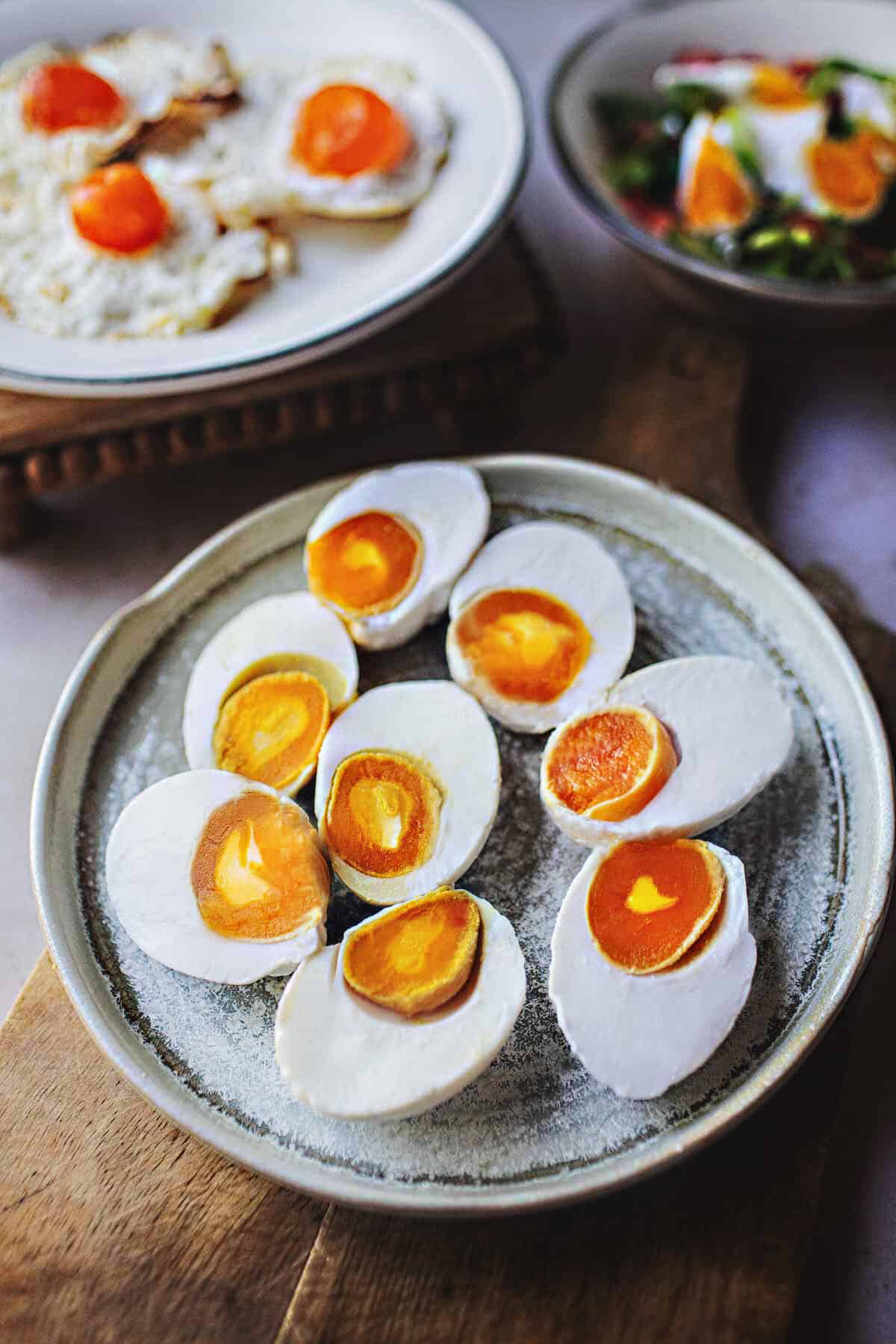
In Thai cooking, they’re versatile, used in stir-fries, salads, soups, fried rice, and even dipping sauces. For a quick treat, enjoy them plain with sticky rice!
Pair your salted egg with this stir-fried squid dish to create this mouthwatering Thai stir-fried dish—the perfect match for bold, savory flavors!
Add a savory twist to dishes like Jok Thai rice porridge, glass noodles soup, water spinach stir fry, a bowl of Thai fried rice, or a light salad, where salted eggs provide both saltiness and protein.
More similar dishes that you'll love my Thai pickled garlic, pickled chili vinegar chili, and pickled mustard greens.
Jump to:
- Why You’ll Love Salted Eggs
- What do Salted Eggs Taste Like
- Ingredients to Make Salted Eggs
- Different Methods for Making Salted Eggs
- How to Make Salted Eggs
- Different Ways to Cook Salted Eggs
- Store and Use
- Kitchen Tips
- Storing Salted Eggs
- FAQs
- Frequently Asked Questions
- Other Recipes from Simply Suwanee
- How to Make Salted Eggs
- Related Thai Recipes
Salted eggs are cherished across Asia; in Chinese cuisine, they’re essential in traditional dishes like moon cakes and Chinese mooncakes. With just a little effort and patience, you can make homemade salted duck eggs that rival those from Asian grocery stores.
Why You’ll Love Salted Eggs
- Versatile Ingredient: These salty eggs are perfect for baking, stir-fries, snacks like hairy gourd, or traditional treats like glutinous rice dumplings.
- Easy to Make: You can create a pantry staple for countless new recipes with just a few steps. The longest part is the waiting period!
- Customizable Flavor: Adjust the thick layer of salt to achieve your preferred level of saltiness.
What do Salted Eggs Taste Like
Salted eggs have a unique, savory flavor that’s both salty and rich. The salted egg yolk is creamy, often with a slightly grainy texture, and it can range from golden yellow to a vibrant red egg hue. The firm yolk has an intense, umami-packed taste that’s perfect for enhancing dishes in an egg yolk recipe.
The white part is much saltier, thanks to its higher salt content, and can feel a little bit chalky. It’s best chopped finely to balance its strong flavor in recipes. Together, salted eggs are a delicious addition to salads, fried rice, or even on their own!
Ingredients to Make Salted Eggs
This salted egg recipe requires only a few good quality ingredients:
- 10-12 fresh eggs: Use fresh duck eggs for richer flavor and firm yolks, or substitute with large eggs or regular eggs. The size of the eggs matters, too, as the larger ones will take longer to cure.
- 1 cup kosher salt: The main ingredient for curing. Use table salt, sea salt, or fine salt if needed.
- 4 cups water: Dissolve salt in hot water to create the brine.
- Optional ingredients: Add bay leaves, star anise, cloves, cinnamon, or Shao Hsing cooking wine for subtle aromas and enhanced flavors.
Different Methods for Making Salted Eggs
For home kitchens, the brining method is the easiest and most practical way to make delicious salted duck eggs or regular eggs.
- Traditional Method: This old-school method involves coating whole eggs in a salted paste made from salt, clay, or even termite mounds, then curing them in a dry place for weeks. While it works well and has been used for ages, it’s time-consuming and a bit messy compared to other techniques.
- Charcoal Paste: Some people use charcoal paste mixed with salt water to coat the eggs. The thick layer of paste seals the eggs and infuses the yolks with a subtle, smoky flavor. It’s a unique way to make salted eggs, but not as common as other methods.
- Brine Method: This is my go-to method because it’s so simple and effective! Just submerge the whole eggs in a saltwater solution known as brine. For more flavor, you can add extras like star anise or Shaoxing wine. It’s quick to set up, requires minimal effort, and delivers perfectly salty eggs with firm yolks in a few weeks.
How to Make Salted Eggs
1. Clean the Eggs: Wash eggs thoroughly under cold running water. For homegrown eggs, scrub gently to remove dirt or grime. Make sure to use cold water and hot water, as the temperature can interfere with the curing process.
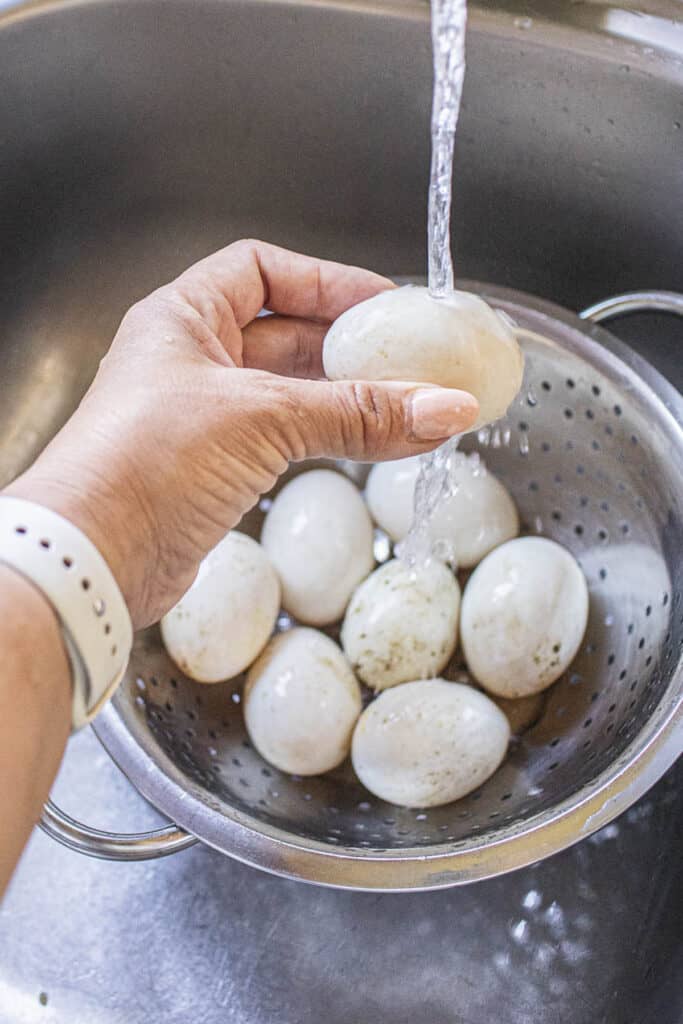
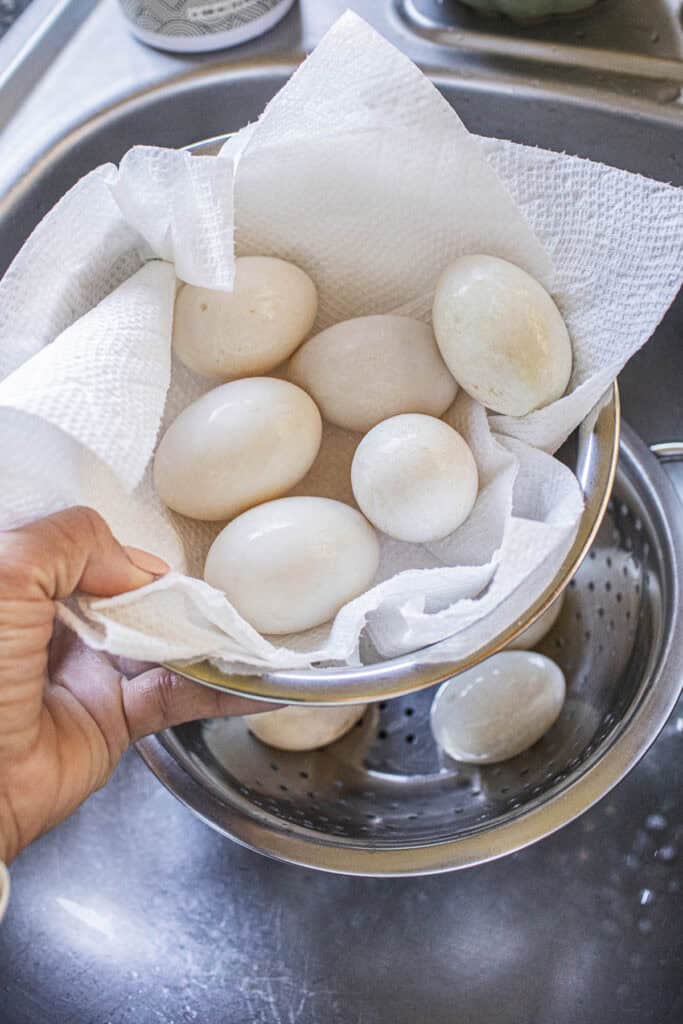
2. Prepare the Salt Solution: In a large pot, dissolve cups of salt in boiling water over medium heat. Let the brine cool to room temperature before adding to the jar with eggs.
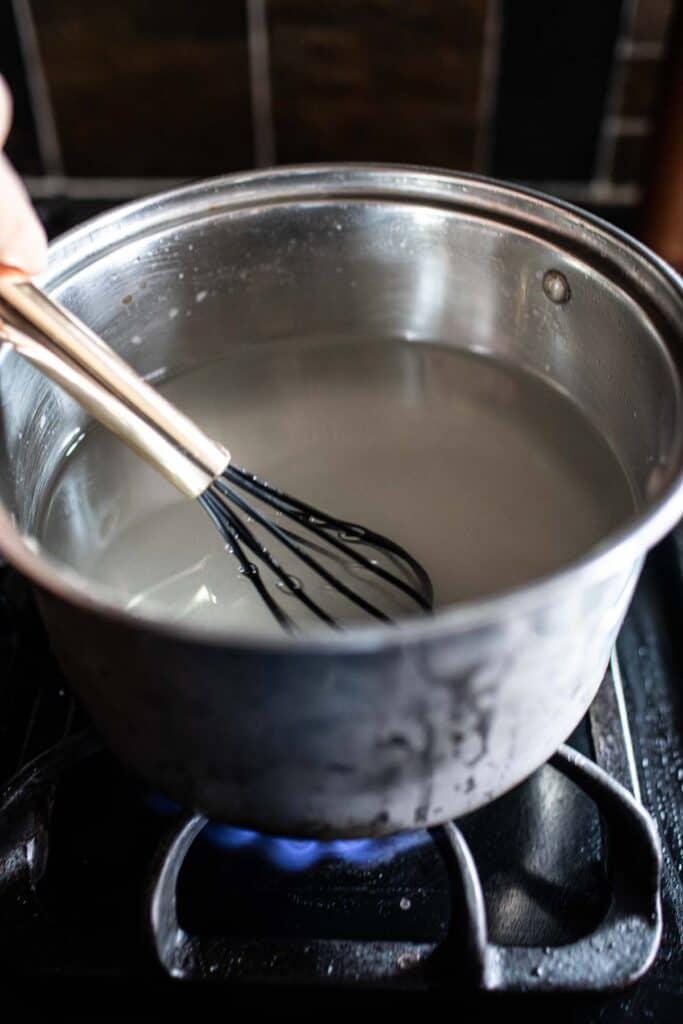
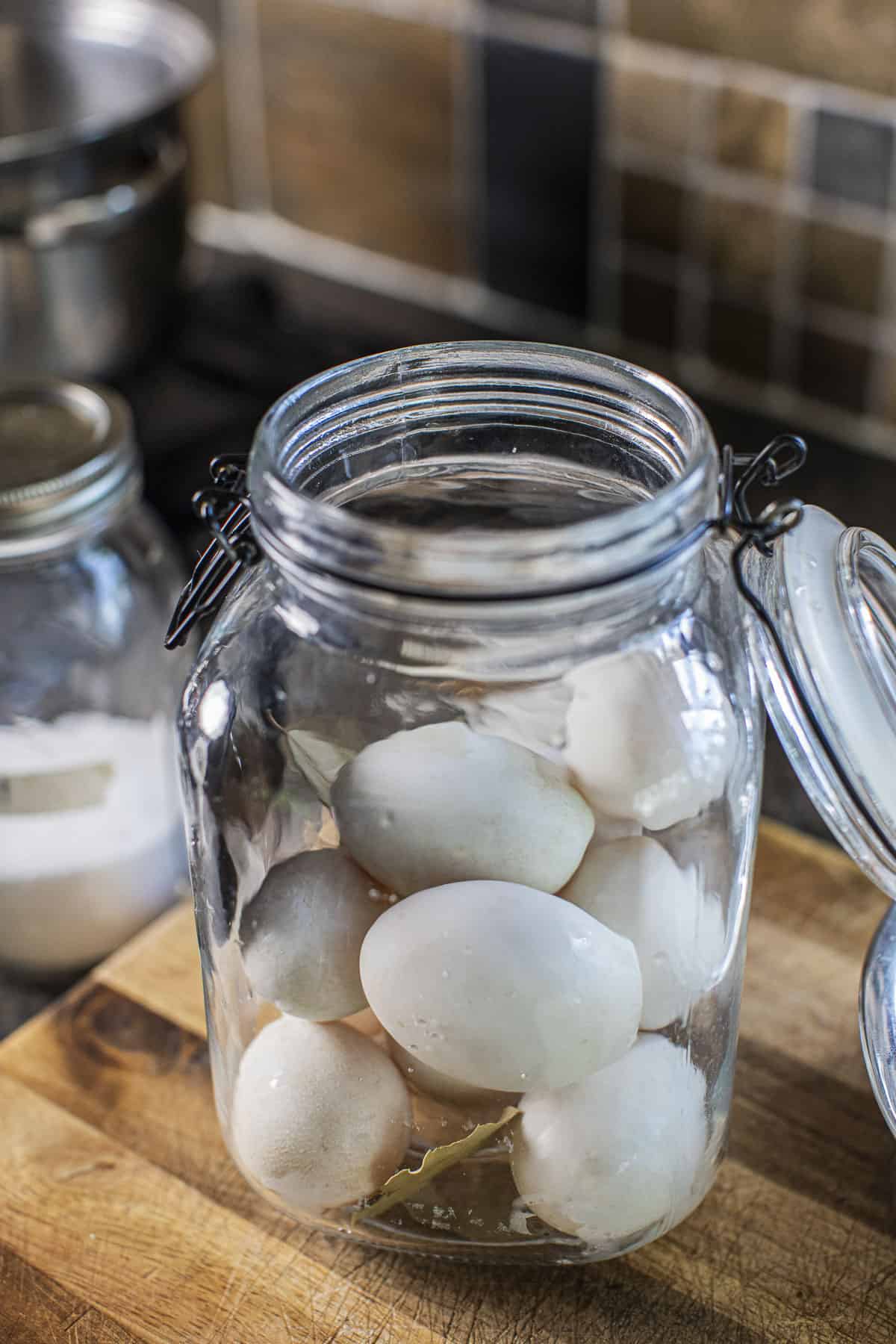
3. Combine Brine and Eggs: Place eggs in a glass container. Add your favorite spices here if you'd like additional flavors. Pour the cooled brine over the whole eggs. Make sure they’re fully submerged. Weigh them down with a small bowl, food-safe plastic bag, or cups of clay if needed.
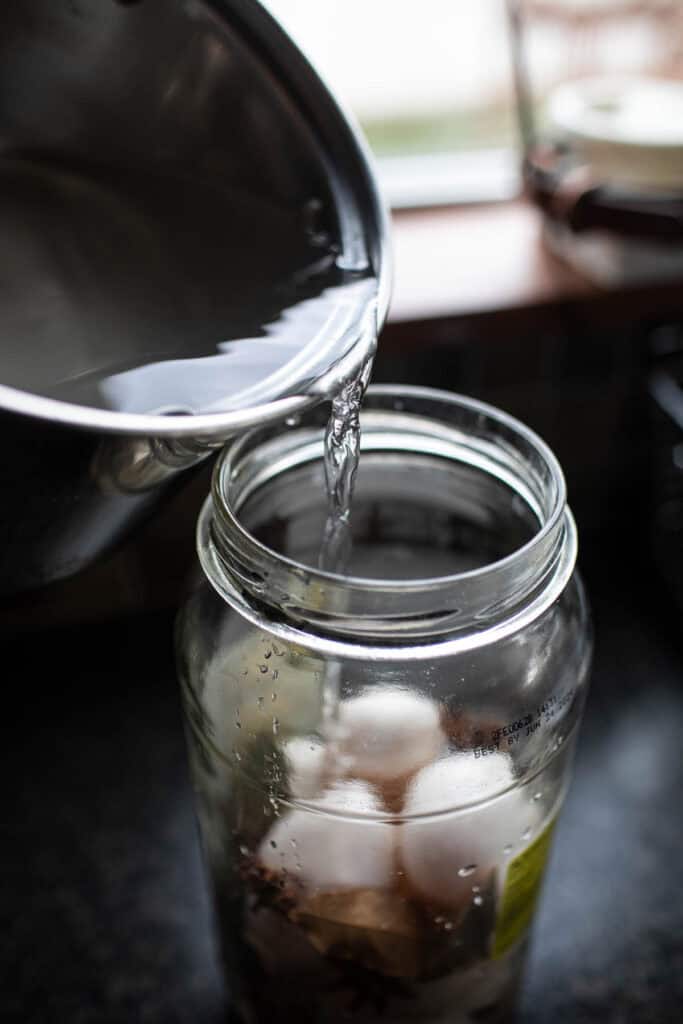
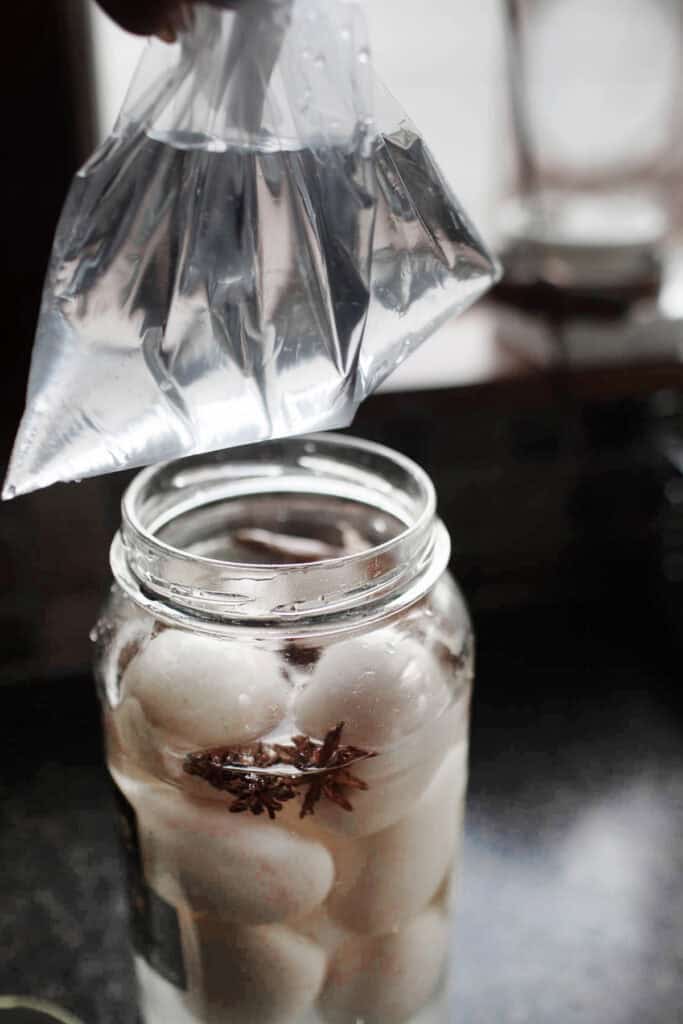
4. Cure the Eggs: Store the glass jar in a dry place away from direct sunlight for 2-4 weeks. The pickling time determines how salty the eggs become.
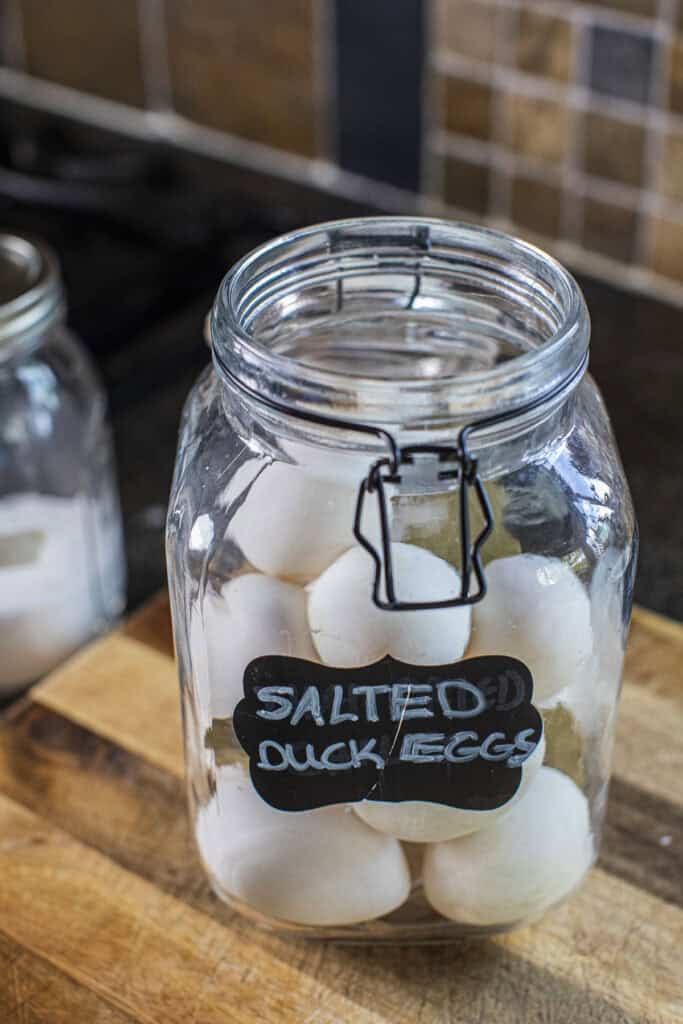
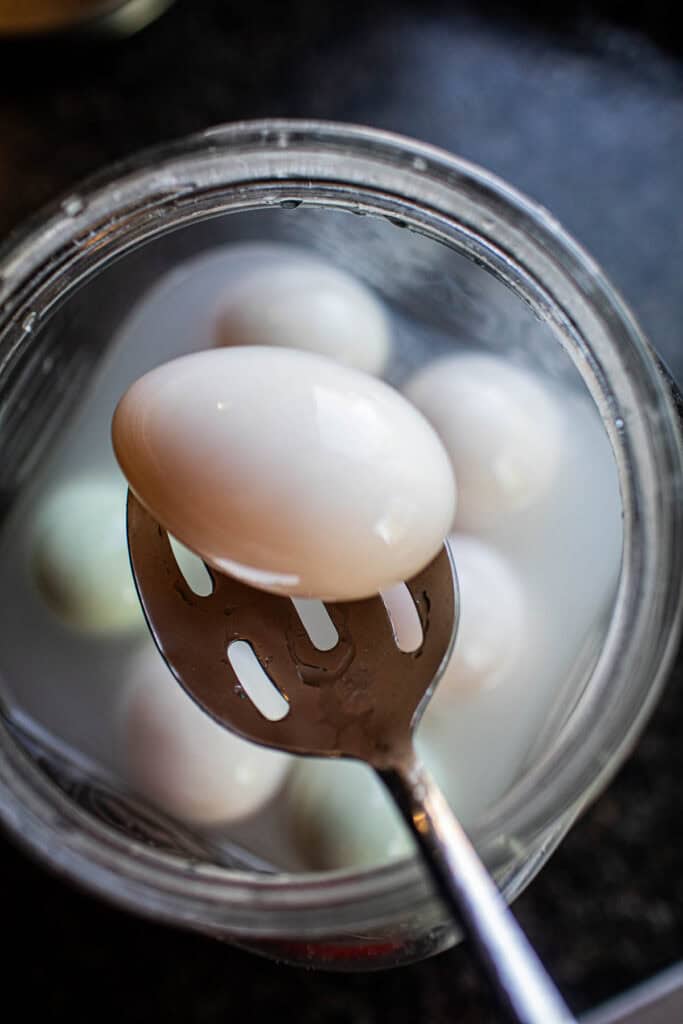
5. Test for Doneness: After 2 weeks, boil one raw egg, let it cool, and check the color of the yolk (bright orange) and texture. The salted egg taste should be perfectly salted and creamy.
Different Ways to Cook Salted Eggs
Each method brings out the unique flavors of salted duck eggs, making them versatile for countless dishes. Try them and discover your favorite way to enjoy this popular delicacy!
- Boiled Salted Eggs: A classic way to enjoy salted eggs—cook them like normal eggs! They are perfect as a quick snack or paired with rice dishes. Boil for 8-10 minutes for firm whites and rich, creamy yolks.
- Scrambled Salted Eggs: My favorite method! Lightly scramble the eggs, then cut them into small pieces to sprinkle over salads, soups, or even sandwiches. The salted yolks add a creamy texture and vibrant color to any dish.
- Steamed Salted Eggs: Steam the eggs for 10-12 minutes to preserve their creamy yolks and delicate texture. Great as a topping, a side dish or eat it plain with white rice!
Store and Use
Once cured, store uncooked salted duck eggs or chicken eggs in an egg carton in the fridge for up to a month.
Kitchen Tips
- Homegrown Eggs: Wash thoroughly, scrub the shells gently, and dry with paper towels before curing.
- Egg Size Matters: Larger eggs, like duck eggs, take longer to absorb the brine. Allow enough pickling time for the brine to seep through the egg shells for the best results.
- Salt Water: A strong brine solution helps with proper curing. You’ll need a lot of salt to make the process effective.
- Weighing Down Eggs: Use a food-safe plastic bag filled with water as a weight to keep the top of the eggs fully submerged.
- How salted eggs taste: Salted egg white can feel a bit chalky if you're not used to them, so chop them up nice and fine for small, flavorful bites that aren’t too intense.
Salted eggs are a popular delicacy in Asian grocery stores, but making them at home is easy and cost-effective. Whether adding them to stir-fries, soups, or salads, these salty eggs are a flavorful addition to your favorite dishes!
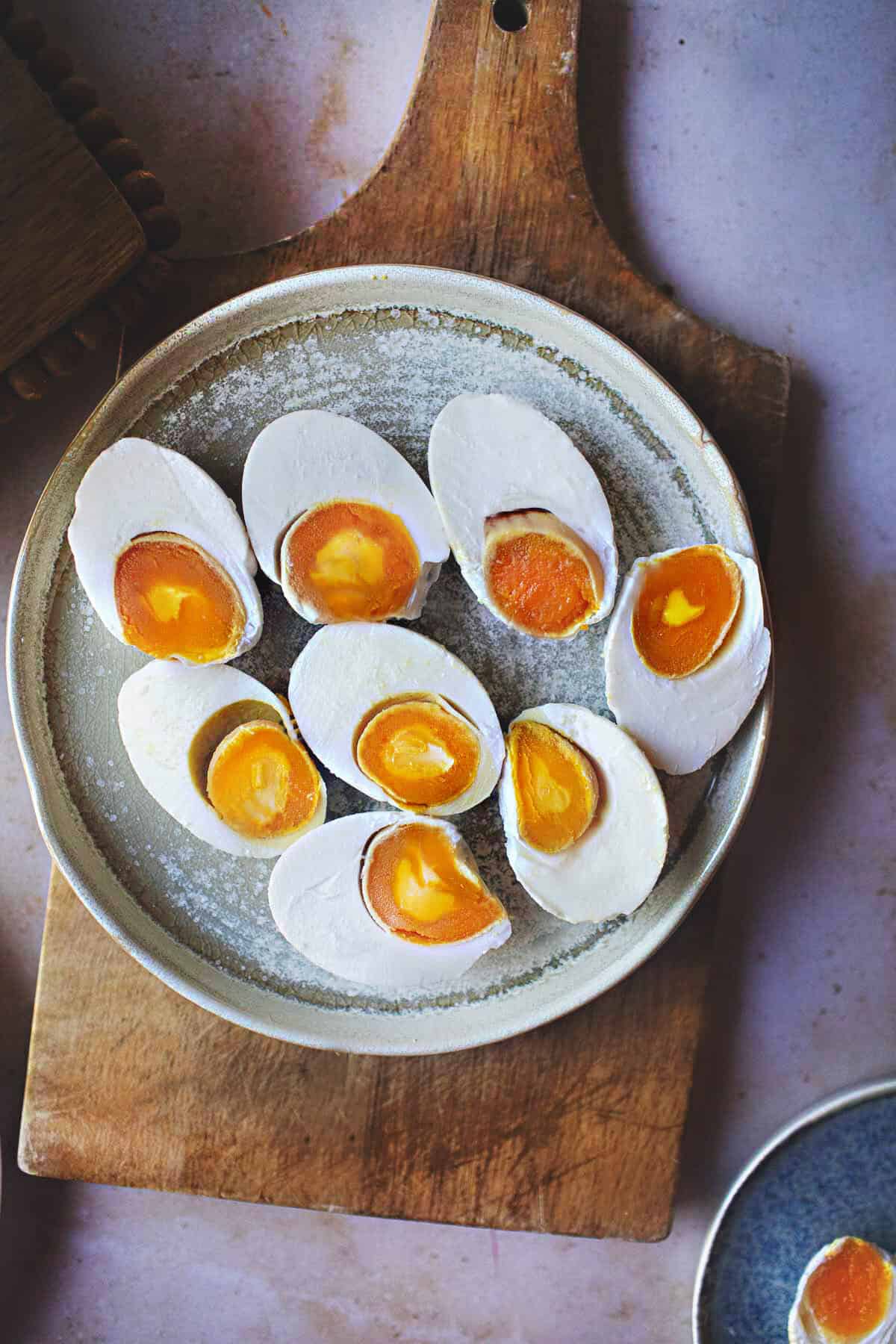
Storing Salted Eggs
FAQs
Frequently Asked Questions
Check for a foul smell, slimy texture, or discoloration. If the egg smells off or looks odd, it’s best to toss it.
In moderation, yes! However, salted eggs are high in sodium, so eating them daily might not be the best for your health.
Salted eggs add rich flavor and texture to dishes, preserve eggs for a longer time, and are a popular delicacy in many Asian cuisines. Plus, they’re versatile in both sweet and savory recipes!
Other Recipes from Simply Suwanee
- Khao Tom
- Thai chili hot sauce
- Pad Woon Sen
- Thai boat noodles
- Massaman curry with Chicken or beef
- Prik Nam Pla
Love this recipe? Please leave a 5-star rating below and share your experience in the comments. Your feedback helps others and supports Simply Suwanee!
Print
How to Make Salted Eggs
- Total Time: 10 minutes
- Yield: 10
- Diet: Gluten Free
Description
Salted eggs, a popular delicacy in Asian cuisine, are made by a simple curing process that turns duck eggs or regular eggs into creamy salted egg yolks and savory egg whites. With just a few ingredients and easy steps, making homemade salted eggs is much simpler than you’d think!
Ingredients
- 10 duck eggs or 12 chicken eggs. (Duck eggs are bigger)
- 2 cups salt
- 6 cups water
- Optional ingredients: Add bay leaves, star anise, cloves, cinnamon, or Shao Hsing cooking wine for subtle aromas and enhanced flavors.
-
Instructions
- Clean the Eggs: Wash eggs thoroughly under cold running water. For homegrown eggs, scrub gently to remove dirt or grime. Make sure to use cold water and hot water, as the temperature can interfere with the curing process.
- Prepare the Salt Solution: In a large pot, dissolve cups of salt in boiling water over medium heat. Let the brine cool to room temperature before adding to the jar with eggs.
- Combine Brine and Eggs: Place eggs in a glass container. Add your favorite spices here if you'd like additional flavors. Pour the cooled brine over the whole eggs. Make sure they’re fully submerged. Weigh them down with a small bowl, food-safe plastic bag, or cups of clay if needed
- Cure the Eggs: Store the glass jar in a dry place away from direct sunlight for 2-4 weeks. The pickling time determines how salty the eggs become.
- Test for Doneness: After 2 weeks, boil one raw egg, let it cool, and check the color of the yolk (bright orange) and texture. The salted egg taste should be perfectly salted and creamy.
Notes
- Homegrown Eggs: Wash thoroughly, scrub the shells gently, and dry with paper towels before curing.
- Egg Size Matters: Larger eggs, like duck eggs, take longer to absorb the brine. Allow enough pickling time for the brine to seep through the egg shells for the best results.
- Salt Water: A strong brine solution helps with proper curing. You’ll need a lot of salt to make the process effective.
- Weighing Down Eggs: Use a food-safe plastic bag filled with water as a weight to keep the top of the eggs fully submerged.
- How salted eggs taste: Salted egg whites can feel a bit chalky if you're not used to them, so chop them up nice and fine for small, flavorful bites that aren’t too intense.
- Prep Time: 10
- Cook Time: 2-4 weeks
- Category: Side dish
- Method: Brining
- Cuisine: Thai
Related Thai Recipes
Looking for other recipes like this? Try these:


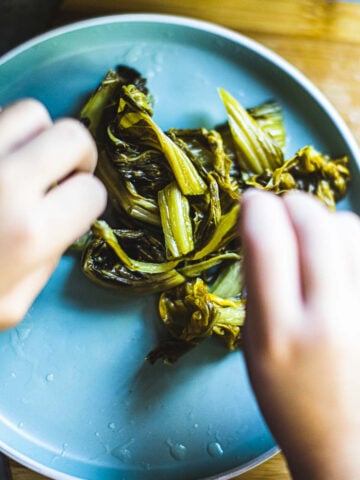
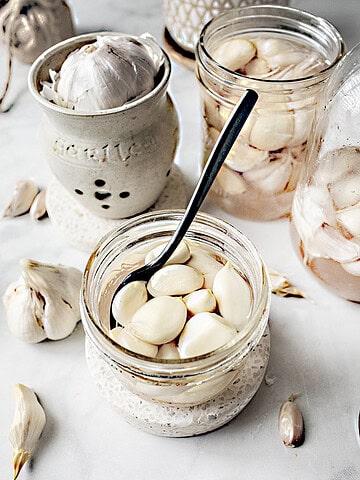
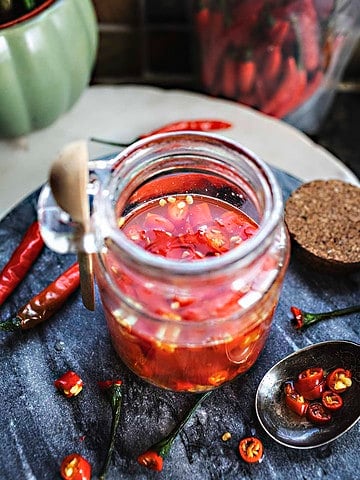
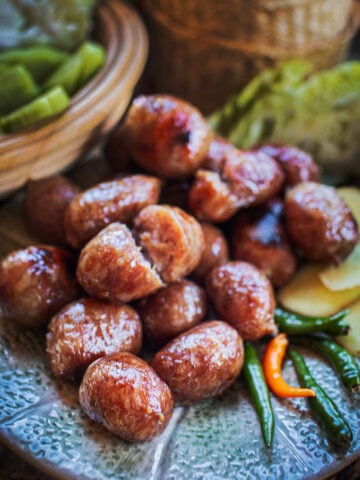

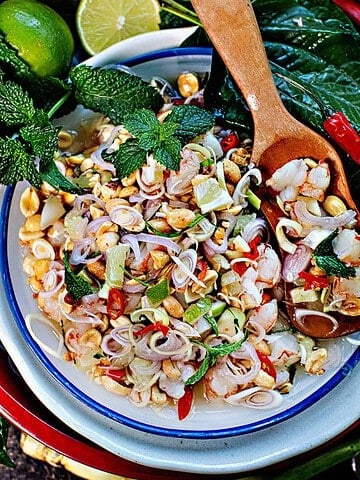

Leave a Reply